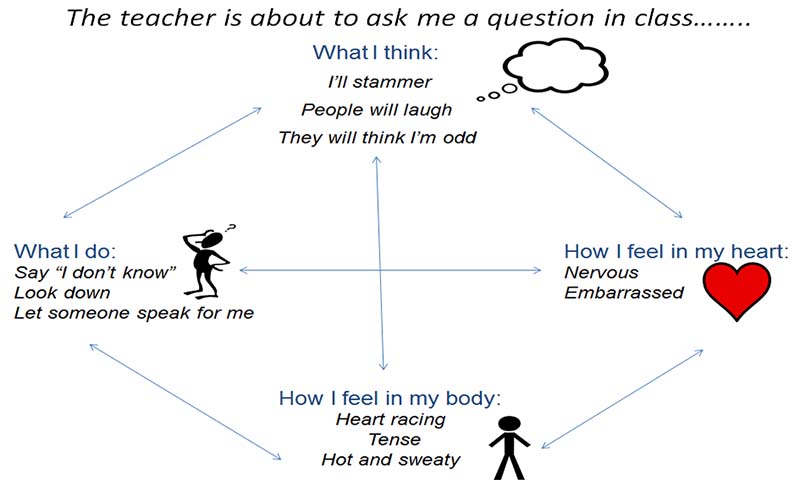Children - Expecting the worst?

There are a number of techniques you can use to help you think more positively and stop you from expecting the worst.
Do you always expect the worst?
Why might it be helpful to change this way of thinking to something more positive?
- It would help you to be more confident
- It would help you to feel more relaxed
- It could help you to be more fluent
The idea is that how we think affects how we feel, which affects us physically...
And all these affect how we speak.
For example, answering the register can be a nightmare. Every day you go into school dreading the moment when it is your turn.
- You think: "I'm going to stammer again, I won't be able to say my name, everyone will laugh". These are really horrible thoughts
- You start to feel panicky
- Then your muscles tense up and you get "butterflies"
- Then, maybe you do stammer just as you expected, or maybe it was okay, but whatever happens, you start to worry about next time
 This is what we call a vicious cycle:
This is what we call a vicious cycle:Thoughts like these really do make it worse. So the next time you are worried about stammering, see if you can spot a vicious cycle like the one above.
Things to think about
Give yourself a little time to think about how unhelpful these worrying thoughts are and how they really wind you up! Then have a go at trying to think of some more helpful thoughts, like "oh well, everyone knows that I sometimes get stuck, and they aren't that interested", or "well, it only lasts a couple of seconds anyway", or "I don't always get stuck on my name, maybe it'll be okay today", or "so what? I've coped before and I can cope again."
Afterwards, check how you did - were you able to tell yourself something a bit more helpful? Did you manage to say your name, even though you stammered? Did everyone laugh, or only one or two of the nerds in the class?
Afterwards, check how you did - were you able to tell yourself something a bit more helpful? Did you manage to say your name, even though you stammered? Did everyone laugh, or only one or two of the nerds in the class?’ to ‘Did everyone laugh, or only one or two in the class?
Thinking about your own skills
Did you know that when we are communicating with other people, only 30% is to do with the actual words we say? Sounds strange doesn't it? But most of our communication is to do with our body language.
When we have a conversation we are not just concentrating on the words, we are also noticing how relaxed a person is, whether they are looking at us, smiling, nodding, listening to us and are genuinely interested in what we are saying. And this works both ways.
If you look relaxed, smiley and interested, people will want to talk to you. But if you are looking away or seem tense or anxious, people will feel uncomfortable about talking to you. The stammering is less important than you think - your body language tells more about you than your speech.
The important skills related to body language are:
Looking at people when you are talking (but not staring!). Listening and showing that you are listening by nodding, smiling, appearing relaxed, not looking as if you can't wait to get away!
So, even if you feel nervous or worried, have a go at trying to look as if you feel okay. We're not telling you to "just relax" and all will be well. But we do know that the conversation will be easier if you seem to be okay! And it gets easier with practice. Remember the buzz words - have a go!
These tricks are often hard work and when they don't work, they don't help. In fact sometimes they make communicating even harder because people may not understand what you say and then you have to try again...
Last updated19 Jun 2019

